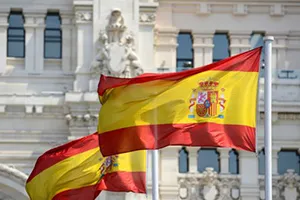 Spain’s Council of Ministers (Consejo de Ministros), composed of the Prime Minister, the deputy prime ministers, and the ministers, considered a draft bill called the “New General Law on Audiovisual Communications”, also known as the “Spanish Influencer Law”. The legislation aims to establish rules and guidelines governing the legal rights and obligations of influencers and content creators who attract followers on different social media platforms.
Spain’s Council of Ministers (Consejo de Ministros), composed of the Prime Minister, the deputy prime ministers, and the ministers, considered a draft bill called the “New General Law on Audiovisual Communications”, also known as the “Spanish Influencer Law”. The legislation aims to establish rules and guidelines governing the legal rights and obligations of influencers and content creators who attract followers on different social media platforms.
Thus, the southern European country comes at the forefront of the efforts on the old continent to regulate social media content, including standards for gambling advertisements.
Over the past few years, there has been a noticeable surge in the use of social media platforms to promote various industries, including gambling. However, doubts have been raised about the impact of this advertising content on vulnerable individuals, especially minors.
Adopted in 2020, Spain’s Royal Decree on Advertising questioned operators’ advertising and marketing rights by introducing strict limitations on the promotion of casino gaming products. Jdigital, Spain’s Digital Gaming Association, disputed the laws, arguing they were against the constitution. In response to this move, the Spanish Supreme Court partially revoked some restrictions on gambling ads.
Subsequently, gambling operators were allowed to offer promotions to new customers, advertise their content on social media, and benefit from using celebrities and social media personalities for their marketing campaigns. Despite this favorable turn of events for gambling operators, Spain’s new Minister for Social Rights and Consumer Affairs confirmed the introduction of new limitations on gambling ads earlier this month.
Social media influencers must comply with new strict rules when presenting gambling-related content. They will be required to ensure it is not targeted at minors, disclose information about the risks associated with gambling, and promote responsible gambling practices.
The Legal Rights and Obligations of Content Creators as per the New General Law on Audiovisual Communications
 The new law will apply to content creators and includes additional rules for individuals whose proceeds from social media platforms exceed €300,000 annually. As per the government’s proposal, they will be recognized as “audiovisual content service providers.”
The new law will apply to content creators and includes additional rules for individuals whose proceeds from social media platforms exceed €300,000 annually. As per the government’s proposal, they will be recognized as “audiovisual content service providers.”
Furthermore, major content creators would have to register their businesses and social media profiles with the State Registry of Audiovisual Providers. They will be required to disclose their activity and assume editorial responsibility for the content they produce.
Content creators would have to adhere to the country’s Royal Decree on Advertising, dictating to observe certain time frames during which gambling ads are prohibited. They must also refrain from promoting gambling incentives.
Non-compliance with obligations could lead to fines from €10,000 to €150,000, and possible termination of advertising rights. Spanish legislators aim to introduce such measures to counter the negative impact of non-compliant gambling advertisements and safeguard vulnerable individuals from gambling’s potential adverse effects.
While the new Law on Audiovisual Communications establishes strict guidelines and ensures the safety of minors, it also protects content creators’ rights and their intellectual property.